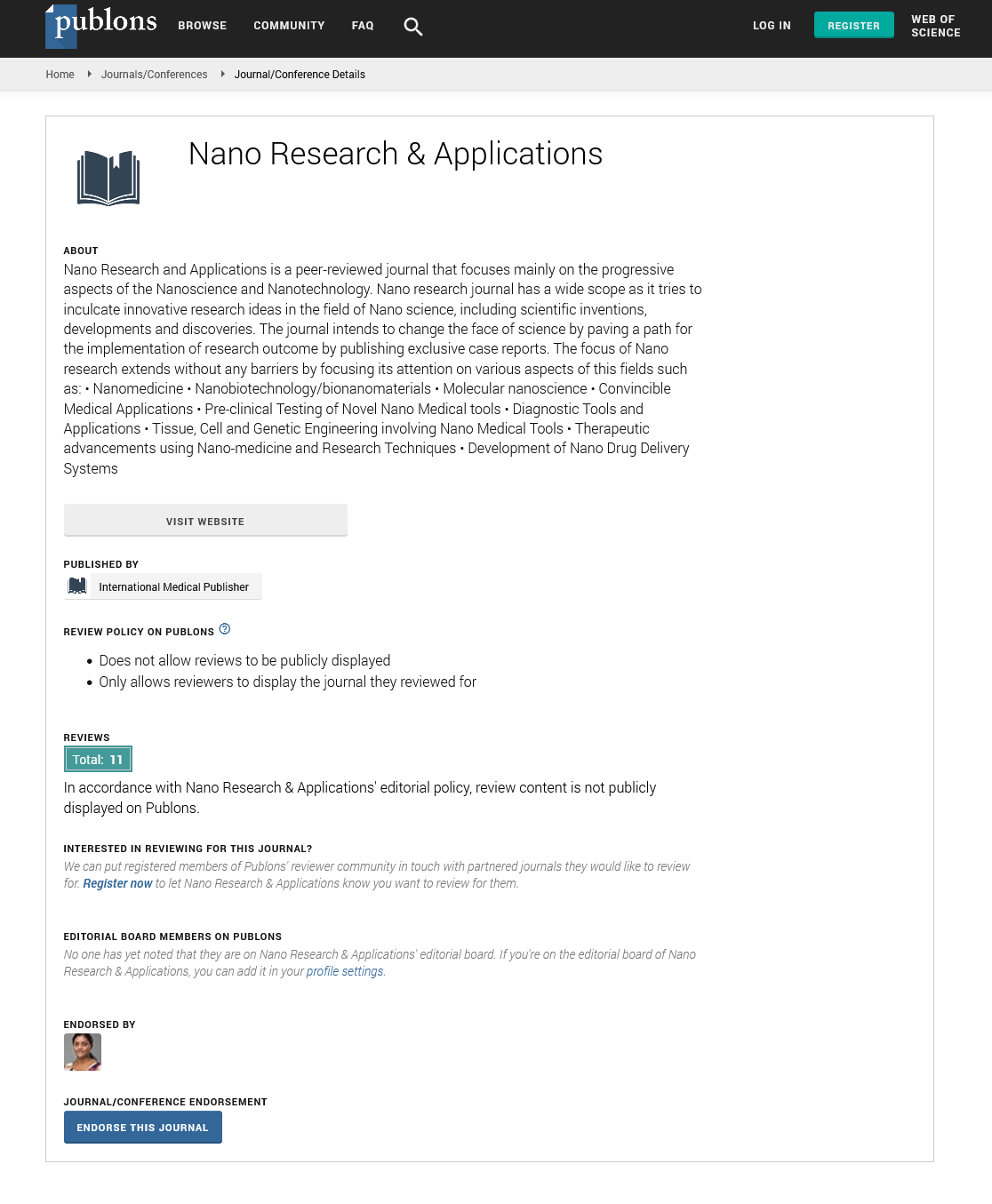ISSN : 2471-9838
Nano Research & Applications
Nano engineered plasma polymer films for biomedical applications
Joint Event on 25th Nano Congress for Future Advancements & 12th Edition of International Conference on Nanopharmaceutics and Advanced Drug Delivery
August 16-18, 2018 | Dublin, Ireland
Krasimir Vasilev
University of South Australia, Australia
Keynote: Nano Res Appl
DOI: 10.21767/2471-9838-C3-013
Abstract
In this talk, author will present recent developments from his lab on various biomaterial coatings that are facilitated by plasma deposition. These include antibacterial coatings, drug release platforms and cell guidance/capture surfaces. Undesired bacterial adhesion and subsequent colonization of medical devices is a substantial medical problem causing complex and sometime fatal infections. We have developed various strategies for generation of antibacterial coatings that can be applied to medical device surfaces. These involve means such as silver nanoparticles, antibiotics, nitric oxide, quaternary ammonium compounds (QACs) or simply coatings that have intrinsic low fouling properties. All these coatings are facilitated by plasma deposition, a technique that provides functional films placed to the surface of any type of material. Important for applications, we not only extensively test our coating for their antibacterial efficacy against medically relevant pathogens but also assess their potential cytotoxicity to mammalian cell and inflammatory consequences. We have also developed methods for the synthesis and surface immobilization of hybrid antibacterial nanocapsules and nanoparticles, including such capable of triggered release. In a second part of the talk author outline his work on developing advanced nanoengineered plasma polymer coatings capable of directing cellular behavior including adhesion, proliferation, differentiation and migration. We have developed unique capabilities to control and tailor entire spectrum of surface properties such as chemistry, wettability, ligand densities, nanomechanics and nanotopography in a substrate independent fashion. We can tailor all these surface properties in a gradient manner too. Author will demonstrate how we use surface gradients of nanoparticles density to study the influence of surface nanotopography on the behavior of various cell types, including immune cells and author will outline how we guide the differentiation of stem cells by tailoring surface chemistry, nanotopography or density of signaling molecules. Author will briefly present drug delivery and release platforms that we have developed including a method for solvent free encapsulation of drug particles. A recently developed device for selective cancer cell capture for complex liquids and how it is used for diagnostic of bladder cancer will also be presented.
Biography
Krasimir Vasilev completed PhD at the Max-Planck Institute for Polymer Research in Mainz, Germany in 2004. After a short postdoctoral stay as a Marie Curie Fellow at the Institute of Genomics and Molecular and Cellular Biology in Strasbourg, France, in 2005, He accepted a research position at the University of South Australia. He was appointed as a Senior Lecturer in March 2009. In 2010, He was awarded the prestigious Future Fellowship from the Australian Research Council. He was promoted to Associate Professor in January 2012. He have held positions such as Associate Head of School-Research (2012-2013) and Research Education Portfolio Leader (2014- 2015). In 2016, He was awarded two prestigious fellowships i.e. the Humboldt Fellowship for Experienced Researchers from the Humboldt Foundation and a Research Fellowship from National Health and Medical Research Council (NHMRC). He was promoted to Full Professor on 1st of January 2017.
E-mail: Krasimir.vasilev@unisa.edu.au
Google Scholar citation report
Citations : 387
Nano Research & Applications received 387 citations as per Google Scholar report
Nano Research & Applications peer review process verified at publons
Abstracted/Indexed in
- Google Scholar
- China National Knowledge Infrastructure (CNKI)
- Directory of Research Journal Indexing (DRJI)
- WorldCat
- Publons
- Secret Search Engine Labs
- Euro Pub
Open Access Journals
- Aquaculture & Veterinary Science
- Chemistry & Chemical Sciences
- Clinical Sciences
- Engineering
- General Science
- Genetics & Molecular Biology
- Health Care & Nursing
- Immunology & Microbiology
- Materials Science
- Mathematics & Physics
- Medical Sciences
- Neurology & Psychiatry
- Oncology & Cancer Science
- Pharmaceutical Sciences
